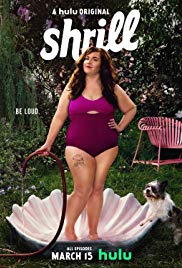Aidy Bryant in "Shrill"
 Friday, March 15, 2019 at 3:00PM
Friday, March 15, 2019 at 3:00PM By Spencer Coile
 Aidy Bryant has been stealing scenes left and right for years now. From a brief stint on Girls, to a supporting role in The Big Sick, to her notable (and Emmy nominated) work on Saturday Night Live, Bryant has been diligently carving out a space for her voice to be heard. Fortunately for long-time fans, 2019 is the year where she has fully paid her dues and doesn't have to steal the scenes anymore since they're centered on her.
Aidy Bryant has been stealing scenes left and right for years now. From a brief stint on Girls, to a supporting role in The Big Sick, to her notable (and Emmy nominated) work on Saturday Night Live, Bryant has been diligently carving out a space for her voice to be heard. Fortunately for long-time fans, 2019 is the year where she has fully paid her dues and doesn't have to steal the scenes anymore since they're centered on her.
Shrill, on Hulu today, is the adaptation of Lindy West’s memoir of the same name. Following timid journalist Annie (Bryant), the series explores what it means to be a plus-size woman living in a world that has excluded them from the cultural conversation...
After an incident involving a man she has been casually sleeping with for several months, Ryan (Luka Jones), Annie decides to take a new lease on life. Much like Bryant herself, Annie carves out a space for her own talents and her own voice to not only be heard, but to be respected.
Though this doesn't come as a surprise it's worth saying that Aidy Bryant is marvelous as Annie. Although based off someone else’s work, within just a few short episodes, it feels as though this was a role Bryant was destined to play. Equal parts deadpan, shy, endearing, and grating, Annie is multifaceted. And Bryant is up to the challenge of exploring her quirks, good and bad. Despite her winning personality, Annie is still full of flaws. Her newfound confidence also comes with her putting herself before those around her. A conflict she has with her best friend and roommate, Fran (a very appealing Lolly Adefope) plays more like an afterthought, but perhaps it will take center stage for season two.
Each episode of Shrill is bookended appropriately with an intimate moment from Annie’s perspective. In the pilot episode, she is confronted with an advertisement at her local coffee shop from a personal trainer who discourages a certain weight from women. When Annie is then approached by this woman in the shop, she is cautious, politely takes a slip from the flyer – afraid to confront this woman face-to-face. With semblance of newfound confidence by the end of that episode, now Annie tells the woman she does not need her help to feel positively about her body. When met with the biting line that she is a “fat bitch,” the camera focuses on Annie’s face. She is blindsided, hurt, angry… but then, she begins to smile. She is fat, and she may be a bitch. It’s no longer an insult, but a source of pride.
In many ways, Shrill is the story about a woman coming to terms with herself. It’s deeply personal, but it expands with the progression of each episode (there are only 6, each under a half hour). In one scene, Annie attends a pool party for plus size women only. Afraid to show off her body, Annie sports jeans and a blouse. It is only when she is pulled out onto the dancefloor that she finally comes to life – embracing her body unapologetically. It is an especially winsome moment in a series with many highs.
I didn’t want to compare the two, but it's not hard to see similarities between Shrill and Lena Dunham’s Girls. Both tell stories about writers, both co-star John Cameron Mitchell as a prickly boss, and both wrestle with themes of acceptance. But where Shrill succeeds against its television counterpart is that it approaches its leading and secondary characters with a bit more nuance and sensitivity. Many were quick to deem Girls the work of privileged white woman who couldn’t read the room/ While some of those criticisms were harsh, they weren’t necessarily wrong.
Unlike Dunham’s character in Girls who claimed she was “the voice of a generation… or a voice of a generation,” Annie (and by extension, Bryant and West) aren’t trying to be the voice of many. They are simply learning to assert themselves in a world that has never quite accepted them. It’s a tricky and precarious process. And while Shrill still has room to grow in later seasons, it’s the journey we take in loving ourselves that matters the most. It's the most quietly revolutionary step we can take.





Reader Comments (3)
Love Aidy! I went to Columbia Chicago when she was an upper classman and watching her improv sets were so inspiring. Happy for her and all her success!
She’s great, and I can’t wait to watch this.
Hopefully, she’ll be a double nominee this year (even though the lead actress comedy category is STACKED).
I watched the first two episodes of this, and it is wonderful. I actually laughed out loud repeatedly. I hope it becomes a hit. So happy for Aidy, Lindy West and Exec Producer Elizabeth Banks.